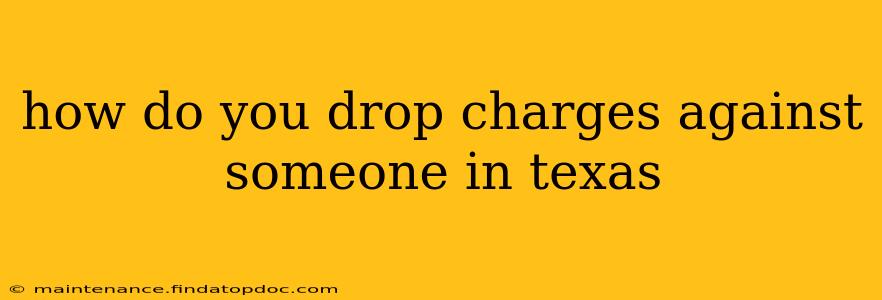How Do You Drop Charges Against Someone in Texas?
Dropping charges against someone in Texas is a complex process that depends heavily on the type of charges, the stage of the legal proceedings, and who is initiating the dismissal. There's no single, simple answer, as it involves several legal pathways. This information is for educational purposes only and not legal advice. Always consult with a qualified Texas attorney for guidance on your specific situation.
Understanding the Players:
- The Prosecutor (District Attorney): In most criminal cases, the District Attorney's office files and prosecutes charges. They have the primary authority to decide whether to drop (dismiss) charges.
- The Complainant (Victim): The person who filed the complaint or reported the crime may have some influence, but they generally don't have the power to unilaterally dismiss charges.
- The Defendant (Accused): The person facing charges has the right to legal representation and to challenge the charges in court, but they cannot directly force the prosecutor to drop them.
- The Judge: The judge oversees the legal proceedings and may make decisions about the case based on legal arguments presented by both sides.
How Charges Can Be Dropped:
1. Prosecutorial Discretion:
This is the most common way charges are dropped. The District Attorney, after reviewing evidence, witness statements, and other factors, may decide the case is weak, lacks sufficient evidence for conviction, or is not in the public interest to pursue. This often happens early in the process, but it can occur even after an indictment.
2. Plea Bargaining:
In plea bargaining, the defendant agrees to plead guilty to a lesser charge or to a different charge altogether in exchange for the dismissal of the original charges. This requires negotiation between the defendant's attorney and the prosecutor.
3. Motion to Dismiss:
The defendant's attorney can file a motion to dismiss, arguing that the charges are legally flawed (e.g., insufficient evidence, violation of the defendant's rights). The judge will review the motion and supporting evidence and decide whether to dismiss the case.
4. Lack of Evidence:
If the prosecution fails to present sufficient evidence to support the charges, the judge may dismiss the case. This often occurs after a preliminary hearing or trial.
5. Insufficient Witness Cooperation:
If key witnesses refuse to cooperate or their testimony is deemed unreliable, the prosecutor may choose to drop the charges.
Frequently Asked Questions (PAAs):
Can a victim drop charges in Texas?
While a victim's wishes are considered, they cannot force the dismissal of criminal charges. The prosecutor retains the authority to decide whether to proceed with the case, considering factors beyond the victim's desires, such as public safety and the strength of the evidence. The victim may be consulted and their input can influence the prosecutor's decision, but the final decision rests with the prosecutor's office.
What happens if charges are dropped?
Once charges are dismissed, the case is closed, and the defendant is no longer facing prosecution for those specific charges. However, the record of the arrest and charges may remain in some databases. A dismissal does not necessarily erase the events that led to the charges.
Can charges be reinstated after being dropped?
In some circumstances, charges can be reinstated. This is typically only possible if new evidence comes to light that significantly strengthens the case or if there was some procedural irregularity in the initial dismissal.
How long does it take to drop charges in Texas?
The timeframe varies significantly depending on the complexity of the case, the willingness of all parties to cooperate, and the availability of resources within the court system. It can range from a few weeks to many months.
What if the charges are against a minor in Texas?
Charges against minors (juveniles) are handled differently through the juvenile justice system. The processes for dropping charges differ significantly, and the involvement of a juvenile probation officer and the family court system plays a major role.
Conclusion:
Dropping charges in Texas is a multifaceted legal process guided by various factors. The ultimate power to dismiss charges generally rests with the prosecutor, although the defendant's legal team plays a crucial role in challenging the prosecution's case. It is imperative to seek advice from a knowledgeable Texas criminal defense attorney for personalized guidance. The information above is for general knowledge only and should not be considered legal counsel.
